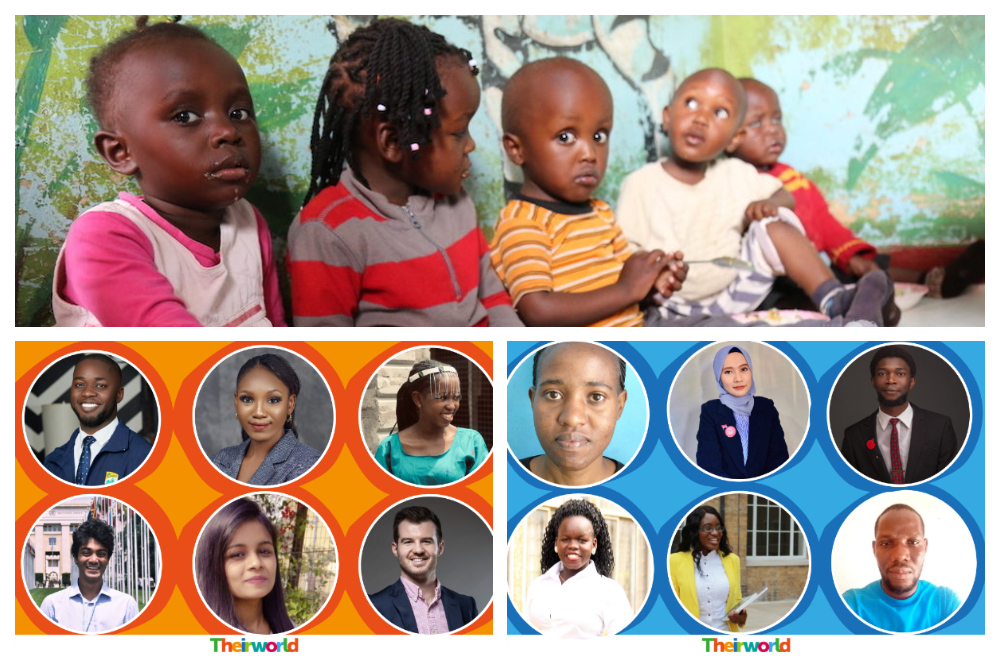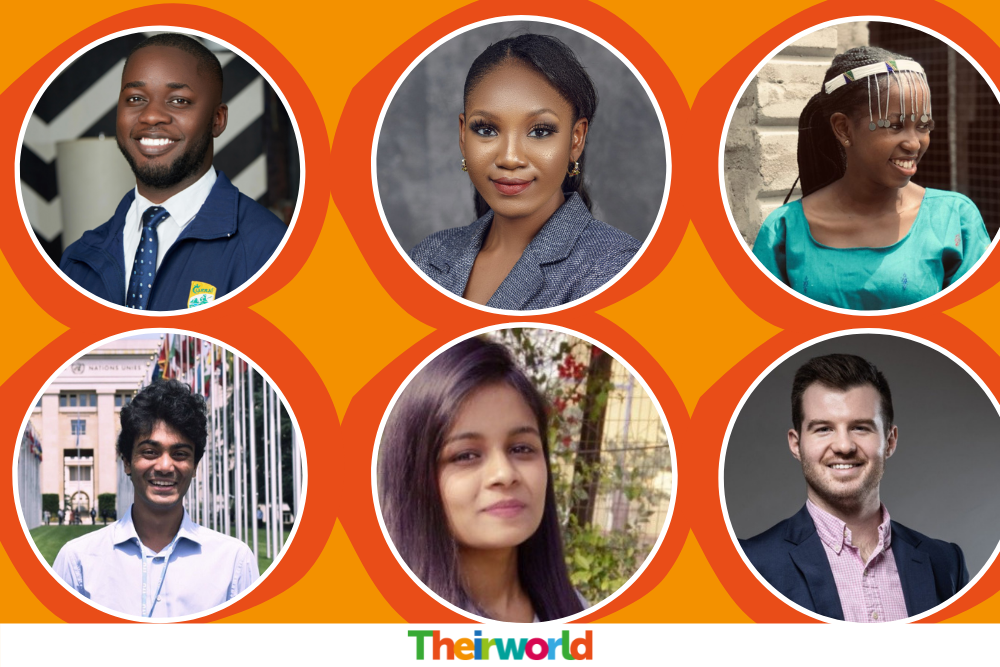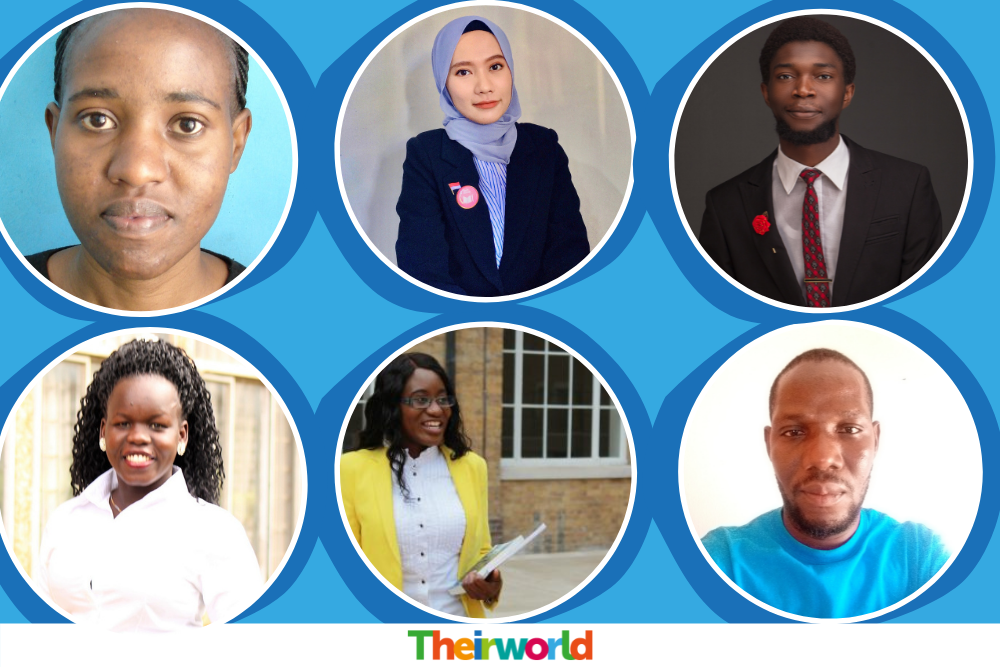
Project Amplify will help our Global Youth Ambassadors make their voices heard on education

Early childhood development, Education funding, Global Youth Ambassadors
Theirworld is to work closely with a group of our passionate youth advocates, who will focus on education financing and early childhood education.
As we get closer to a post-Covid world, it is critical that education is prioritised in the recovery and rebuilding. Now is the time for youth voices to be amplified and for leaders to listen.
Theirworld has launched Project Amplify to give our Global Youth Ambassadors (GYAs) the tools they need to advocate for change. We are starting with a small cohort of 12 passionate GYAs who are ready to take their education campaigning to the next level.
Six will focus on education financing and six on early childhood education. Over the next year, we will work closely with the group to hone their knowledge, build their communications skills and support them to advocate for change at the local, national and global levels.
“We’re so excited to be working closely with this group of young people in our network,” said Dawn Humphreys, Theirworld’s Senior Youth Engagement Manager. “By supporting these young leaders – who are already creating change in their communities – we will help them to harness their knowledge and expertise to drive the conversation that will unlock big change for children around the world.”
Project Amplify is just one initiative of Theirworld’s Global Youth Ambassador programme. Young people aged 18 to 30 from around the world are part of a network of like-minded people who are ready to connect and collaborate to end the education crisis.
Here we find out more about the 12 GYAs in the programme and hear why they are passionate about education advocacy. If you are interested in becoming a Global Youth Ambassador, applications to join the network will be opening again this summer. Register to be the first to hear.
Education Financing cohort

Top row – Charles Falajiki, Motunrayo Fatoke, Hardness Range. Bottom row – Yuv Sungkur, Harshita Jain, Bobby Zipp
Charles Falajiki, 25, from Nigeria
He is passionate about promoting access to education for children in remote and marginalised communities. With experience as an education development practitioner, he believes that innovative education financing is the key to economic recovery and is excited to advocate for this in new ways.
Charles said: “I believe cutting aid to education or reducing national education budgets will not build any economy. It takes an educated generation to build an economy and investing in education is pivotal to providing quality education for all. I am interested in leveraging research, policy and advocacy tools to call the attention of global leaders to the need to continue to invest in education.”
Motunrayo Fatoke, 23, from Nigeria
She is actively involved in access initiatives that aim to bridge the education gap between the privileged and less fortunate. She hopes to see more digital equity and policies that ensure education is funded properly. Through Project Amplify, she is excited to learn more about how we can design innovative financing solutions and to build her advocacy skills.
Motunrayo said: “I strongly believe that with funding there will be a wider reach of accessibility to quality education among individuals in marginalised communities. With adequate financing, the goal of making quality education accessible will be achieved. I want to learn and explore several options on how education can properly be funded in my community and on a global scale.”
Hardness Range, 21, from Tanzania
A student and activist with two years experience as a GYA, she launched a charitable education initiative called Nipe Kitabu that teaches 21st-century skills to students. She has worked to create effective and alternative ways to end the education crisis and has learned that education financing is key to this. She is most excited about developing her knowledge on this topic and learning how we can pressure the public and private sectors to contribute.
Hardness said: “Working with startups, the topic of finance was always there. It is necessary to learn to budget and understand how your income relates to your expenses to avoid accumulating debt. Knowledge in understanding how your finances work and what makes them healthy is part of learning to live without debt in the education field.”
Yuv Sungkur, 21, from Mauritius
He is passionate about the right of every child to access education. Through Project Amplify, he can continue to advocate and campaign effectively for education financing and work towards ensuring every child is presented with the choice of a quality education.
Yuv said: “Every child needs to get educated but, most importantly, they need to be presented with the choice of education. Unfortunately, because of financial struggles, many children do not even have this choice. Advocating and campaigning for education financing through Project Amplify would play a role in facilitating education to the children in need.”
Harshita Jain, 23, from India
Now a programme manager, Harshita was working as an educator when she saw at first hand the prejudices and barriers that threaten the education of millions of children in India. She believes that amplifying her voice is a responsibility and privilege she must use to encourage holistic reform to support inclusive education. She is excited to be able to connect with other GYAs on the core aspects of ending education inequity.
She said: “Prejudices and accessibility barriers continue to threaten the education of millions of children in India and across the globe. There are few organisations that are innovating or being ambitious about learning. I had parents who worked tirelessly to make me understand that it is important to shape my voice that’s empowered to help others grow. This voice that I have today is not only a privilege but also a responsibility. Education in India and the rest of the world needs a passionate effort towards reformation and I want to do something to support an inclusive educational infrastructure.”
Bobby Zipp, 25, from the United States
A fundraiser who is passionate about education financing through his own experiences and those of thousands of American students. He believes radical policy change is needed, alongside developing creative ways in which private and public financing can come together to create solutions. He is looking forward to sharing his own experiences with GYAs, as well as developing his understanding of the diverse education financing landscapes and their respective challenges beyond the United States.
He said: “In my view, education financing is one of the primary mechanisms by which transformational change can take place in schools and school systems. Despite that, they are some of the most challenging aspects to change within education systems.”
Early Childhood Education cohort

Top row – Ann Mwaniki, Desi Saragih, Chinedu Isagbah. Bottom row – Ajwok Valentino, Marian Adejokun, Solomon Ifeanyi Nathaniel
Ann Mwaniki, 27, from Kenya
After surveying early childhood education in her village, she recognised a need to ensure quality in such areas as teacher-student ratio, class sizes and allocation of resources. She wants to raise awareness and fundraise to ensure education needs are met. Ann is most looking forward to sharpening her skills and leadership capabilities, and networking with likeminded people.
Ann said: “Early childhood education is a key determinant of the holistic performance of a child and therefore it is important to ensure that quality education is offered to all children. I hope to see more enrolment of children in schools from rural communities.”
Desi Saragih, 27, from Indonesia
A student whose work in public policy focuses on education policy responses to Covid-19 in Indonesia. She recognised a need for a collaborative approach of global education financing and quality early childhood education. She is excited to develop her knowledge of both sectors, as she believes they go hand in hand.
Desi said: “As I learned about education policy, I found that each country across the world has highly diverse financing strategies, both in terms of national policy and through collaborative approaches with international organisations.”
Chinedu Isagbah, 24, from Nigeria
Through his own experiences, he saw how a child’s education can become disrupted by poverty and conflict. Chinedu believes strongly that early childhood education gives children the power to make choices that are safe and right for their future. He thinks Project Amplify is a great platform to enable him to continue his fight for early childhood education.
Chinedu said: “I come from a nation and especially a region that is the world’s poverty capital, as well as having the most out-of-school children. What else could be more troubling? Early childhood education affords children the power to probe and to make choices that are both safe and sane.”
Ajwok Valentino, 27, from South Sudan
Through her own experiences of disrupted education, she is passionate about creating more opportunities for vulnerable children to get access to quality education. She wants to use her voice to raise the needs of displaced children and to help develop solutions that can change their lives. Now a teacher in the Kiryandongo refugee settlement in Uganda, Ajwok is excited to develop her knowledge and skills of early childhood education to help impact her community effectively.
Ajwok said: “Just as some people invested in helping me acquire education as a disadvantaged child, I feel motivated to contribute to creating more opportunities for vulnerable children to get access to quality education. This would be a great platform for me to voice the needs of the refugee children, to change their lives for the better.”
Marian Adejokun, 29, from the United Kingdom
Through her organisation ReachOut2All CIC, she works to promote the voices of young people and provide them with opportunities to transform their lives. Her academic background in early childhood studies has shown her the impact of a quality education in early life and how this can impact children physically, emotionally and socially. She is looking forward to continue impacting and working with young people and amplifying her own voice.
Marian said: “My key interest when I was studying and doing my research dissertation was the way children learn through play – child-initiated and also adult-led from time to time. Also researching on the importance of play in early years and how this affects child’s learning and development in the early stages of their life – physically, intellectually, emotionally and socially.”
Solomon Ifeanyi Nathaniel, 27, from The Gambia
He is passionate about early childhood education, having observed how many children are becoming disconnected from school because of the pandemic. Solomon wants to continue creating opportunities for underprivileged children in The Gambia and reduce the financial burden the pandemic has had on access to education. He is keen to develop his exposure to early childhood education and continue to support his community.
Solomon said: “Through my organisation’s mobile library project, I have reached over 600 children with learning materials. This has allowed me to realise how important it is to have an early childhood education centre in every community – with qualified and trained teachers who will build the foundation of children, so they are ready for primary school.”
More news

